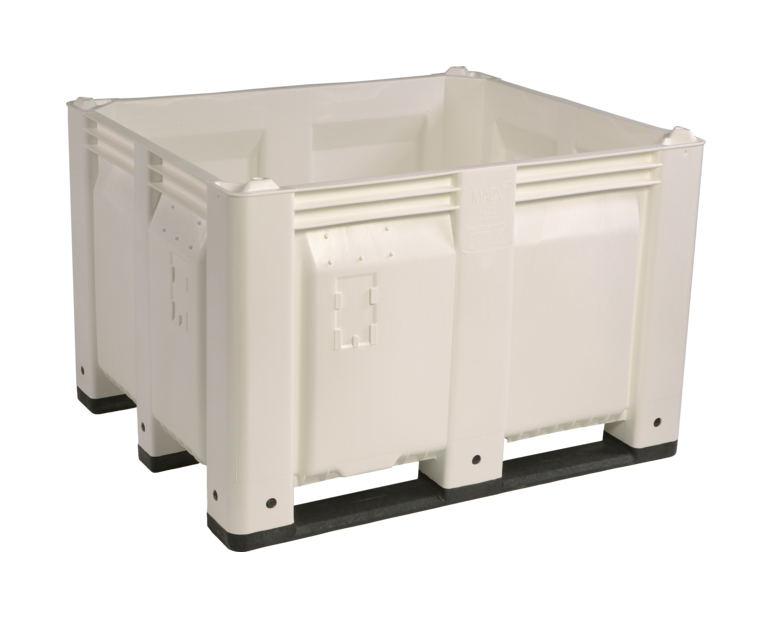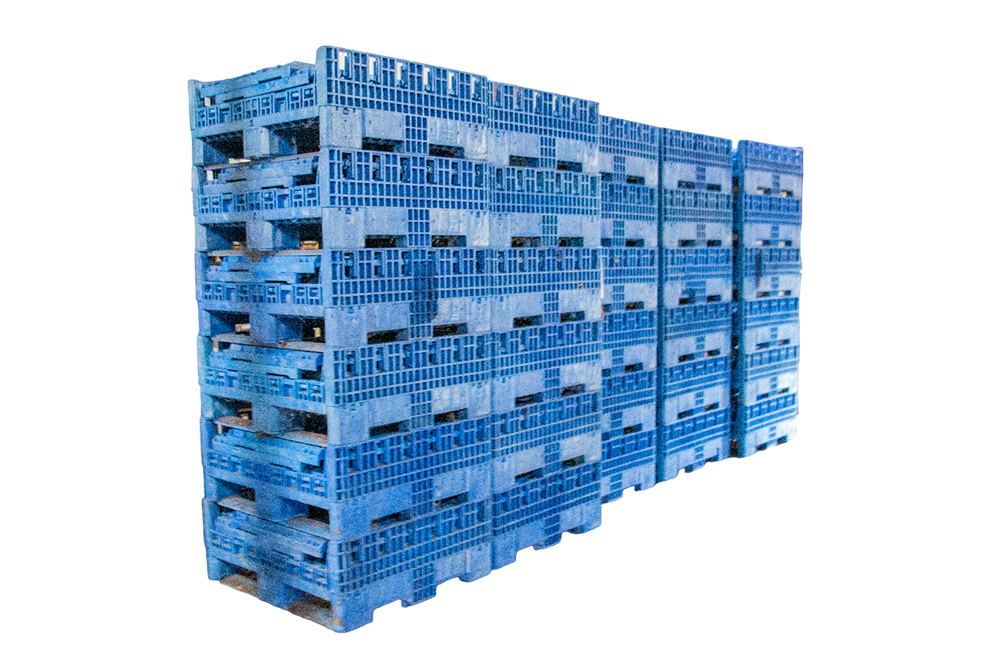Innovative Solutions: Finding the Adaptability of Bulk Containers in Various Industries
Bulk containers have actually become a crucial advancement throughout multiple markets. Their layout enhances storage and transportation performance, dealing with diverse requirements while advertising sustainability. Businesses in farming, production, and logistics report considerable improvements in functional procedures. Nevertheless, truth degree of their influence might not yet be fully realized. Discovering the numerous applications and benefits of bulk containers might expose understandings that improve market standards. What exists ahead for this evolving option?
Enhancing Agricultural Efficiency With Mass Containers
Just how can bulk containers transform agricultural practices? In the domain of agriculture, bulk containers work as a critical technology, improving efficiency and sustainability. They allow farmers to store and transfer large amounts of seeds, grains, and plant foods, reducing the requirement for several smaller plans that usually contribute to waste. By utilizing mass containers, agricultural operations can maximize their supply chains, reducing managing costs and time. These containers are designed for very easy loading and dumping, allowing for swift shifts between different phases of farming processes.
Mass containers promote much better supply management, guaranteeing that producers have ample materials on hand without excess. This effectiveness equates to lowered labor costs and boosted efficiency. In a market typically challenged by rising and fall demand and seasonal variations, the dependability and scalability supplied by bulk containers provide a significant benefit, empowering farmers to focus on top quality and return.
Simplifying Manufacturing Processes Via Bulk Solutions
Bulk solutions play an essential duty in enhancing manufacturing procedures by facilitating efficient product handling and giving cost-efficient storage space choices. These containers help keep a well organized production setting, eventually enhancing operations and efficiency. As markets significantly adopt bulk remedies, they are most likely to experience significant improvements in functional effectiveness.
Reliable Material Handling

Efficient material handling is important for enhancing manufacturing procedures, as it straight influences performance and cost-effectiveness. Using bulk containers can noticeably enhance operations by simplifying the movement and storage of products. Their layout enables easy loading and unloading, minimizing the time employees invest handling private things. This effectiveness not just minimizes labor expenses but also enhances workflow, allowing makers to respond quickly to demand variations. In enhancement, mass containers advertise better company within facilities, assisting in quick accessibility to products and lowering downtime. By implementing these versatile remedies, manufacturers can improve total operational efficiency, ensuring that assembly line run smoothly and effectively while reducing waste and source expense. Mass containers play an important role in boosting product handling practices.
Cost-efficient Storage Space Solutions
As producers seek to optimize their procedures, affordable storage space options become significantly important. Bulk containers provide a sensible ways of saving large quantities of products, decreasing the need for multiple smaller storage space devices. This consolidation results in lower supply costs, as bulk containers commonly require much less handling and lead to decreased labor expenses. In enhancement, their standardized sizes promote reliable stacking and storage, maximizing stockroom space. By using bulk containers, suppliers can lessen waste and boost the total organization of their centers. These containers are also designed for toughness, which can decrease substitute costs gradually. Overall, incorporating mass containers right into storage strategies permits manufacturers to enhance procedures while preserving earnings and effectiveness in their supply chains.
Boosted Production Process
Using mass containers considerably enhances manufacturing operations by simplifying the administration of materials throughout the production procedure. These containers help with efficient storage and transportation, reducing the moment spent on handling products. As an outcome, suppliers can achieve quicker turnaround times and reduce delays in production. Mass containers also advertise far better company, allowing teams to quickly access raw products when required, which further enhances operations. Additionally, the standard dimension and shape of these containers enable maximized usage of stockroom room, adding to total effectiveness. By integrating mass services right into their procedures, firms can improve stock control and lower waste, inevitably resulting in raised productivity and a more dexterous production environment.
Revolutionizing Food Solution Logistics
The food solution sector is going through significant change through the fostering of bulk containers, enhancing storage capacities and enhancing space utilization. Effective storage space options enable businesses to take care of stock better, while streamlined transportation procedures reduce expenses and improve shipment times. Because of this, these technologies are reshaping logistics and driving higher efficiency across the field.
Effective Storage Space Solutions
Cutting-edge storage space services are changing food service logistics by improving performance and optimizing space use. Bulk containers, developed for optimum ability, enable food company to reduce lost area while preserving very easy access to products. These containers can be stacked and organized according to stock demands, simplifying the storage space procedure. In addition, their sturdiness warranties that foodstuff remain secure and risk-free, lowering spoilage and losses. With attributes such as modular styles and compatibility with different shelving systems, these containers can adapt to varied kitchen area layouts. By employing reliable storage remedies, food service operations not just enhance workflow yet likewise boost general productivity, assuring that resources are utilized properly to meet customer needs.
Structured Transport Procedures
While several variables add to the efficiency of food service logistics, structured transport processes play an essential duty in enhancing supply chain operations. The fostering of mass containers substantially enhances the movement of items, permitting quicker loading and dumping at warehouse. Their standardized sizes help with reliable piling and storage, reducing thrown away space during transit. Furthermore, bulk containers decrease the requirement for too much packaging, resulting in decrease costs and lowered environmental effect. By guaranteeing that items are firmly delivered, they reduce damage and wasting, which is necessary in the disposable food market. Generally, the integration of mass containers into transportation methods not just raises operational efficiency yet additionally supports lasting techniques within the food service sector.
The Duty of Mass Containers in Pharmaceutical Supply Chains
In the pharmaceutical market, mass containers play a critical duty in making index sure the secure and efficient transportation of resources and completed products. These containers are specifically designed to satisfy strict regulatory demands, offering excellent protection against contamination and deterioration throughout transit. Their durable building and construction permits for the secure transportation of delicate materials, such as energetic pharmaceutical components (APIs) and complex formulas, while minimizing the danger of damage.
Bulk containers help with structured handling and storage space procedures within stockrooms and manufacturing facilities. Their standard dimensions enable compatibility with automated systems, improving efficiency and reducing labor prices. By making use of bulk containers, pharmaceutical companies can attain considerable cost financial savings via mass purchasing and minimized packaging waste.
Advertising Sustainability in Product Packaging Practices
The pharmaceutical industry's raising dependence on bulk containers has actually motivated a Continued more comprehensive exam of sustainability in packaging techniques across different industries. As companies look for to minimize their ecological impact, cutting-edge approaches to packaging have actually gained grip. Bulk containers, created for reuse and recycling, provide a functional service. Their durability expands item lifecycles, decreasing the need for single-use packaging.
The shift in the direction of eco-friendly finishings and biodegradable materials has ended up being integral in the layout of these containers. This adjustment not only addresses waste reduction however likewise straightens with customer need for lasting products.
Industries such as food and cosmetics are taking on similar techniques, identifying that lasting product packaging can improve brand reputation. Collective initiatives between manufacturers and distributors better promote sustainability, encouraging the growth of closed-loop systems - refurbished bulk containers. Eventually, accepting sustainable product packaging practices is important for promoting a round economy and alleviating the ecological impact across diverse markets
Cost-efficient Transport Solutions With Mass Containers

Bulk containers simplify handling procedures, leading to reduced labor costs and reducing the risk of damage during transit - refurbished bulk containers. Industries such as agriculture, chemicals, and drugs benefit from the longevity and toughness of these containers, which can endure extreme conditions while guaranteeing the stability of their contents
The recyclable nature of mass containers adds to long-term cost savings, as business can rely on less, much more long lasting devices rather than frequently changing single-use product packaging. By doing this, bulk containers not only improve performance yet likewise sustain overall price monitoring in supply chain procedures.
Personalization and Flexibility in Mass Container Layout
While several bulk containers are designed for typical applications, their personalization and adaptability have actually come to be vital attributes for markets with unique demands. Suppliers now use a series of choices, enabling customers to tailor containers to particular measurements, materials, and capabilities. This adaptability makes her explanation it possible for organizations to maximize storage space and transportation procedures, ensuring compatibility with various handling systems.
The food and pharmaceutical markets typically need containers that fulfill rigorous hygiene and safety and security requirements. Custom-made styles may integrate functions such as tamper-proof seals, easy-to-clean surfaces, and specialized ventilation systems. In the farming sector, mass containers can be customized to promote the transport of diverse commodities, from grains to fluids, boosting functional performance.
Inevitably, the capability to personalize bulk containers not just enhances productivity but likewise supports sustainability initiatives by decreasing waste and optimizing resource usage across numerous fields. This versatility positions bulk containers as versatile solutions in today's vibrant market.
Frequently Asked Concerns
What Materials Are Bulk Containers Generally Made From?
Mass containers are typically made from materials such as high-density polyethylene (HDPE), steel, aluminum, or polypropylene. These products offer durability, resistance to chemicals, and the capacity to safely store and deliver various products across sectors.
How Are Mass Containers Cleaned In Between Uses?
Mass containers are usually cleansed utilizing high-pressure washing, vapor cleansing, or chemical sanitization approaches (used collapsible containers). The cleansing procedure guarantees that deposits are removed, preventing contamination and preserving the quality of materials for succeeding uses

Can Mass Containers Be Reused Multiple Times?
Yes, bulk containers can be recycled multiple times. Their robust design enables duplicated use throughout numerous applications, offered they are effectively cleaned and preserved after each use to guarantee security and health standards.
What Are the Weight Limits for Bulk Containers?
Weight restrictions for mass containers typically range from 1,000 to 3,000 pounds, depending on the product and design. Requirements might vary by manufacturer, so it is vital to get in touch with standards for particular container types.
Exist Common Dimensions for Bulk Containers?
Yes, there are typical sizes for bulk containers, normally ranging from 20 to 40 cubic feet. These measurements promote efficient storage and transportation across various markets, making certain compatibility with tools and optimizing space utilization.
Making use of mass containers can significantly enhance procedures by streamlining the motion and storage of materials. In enhancement, mass containers promote much better organization within centers, promoting quick access to materials and reducing downtime. Bulk containers offer a functional ways of keeping big amounts of materials, decreasing the requirement for numerous smaller sized storage space devices. The food solution market is going through significant makeover with the fostering of mass containers, improving storage capabilities and enhancing space utilization. Mass containers assist in structured handling and storage procedures within stockrooms and manufacturing facilities.